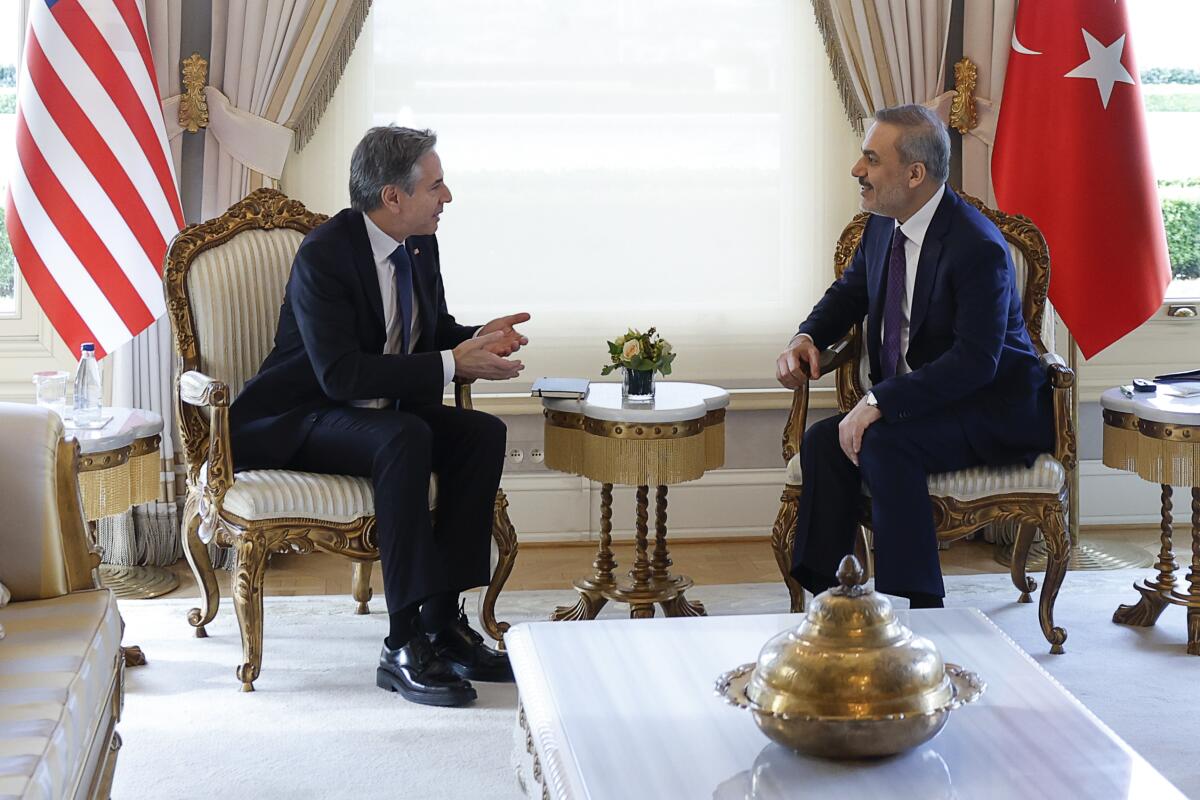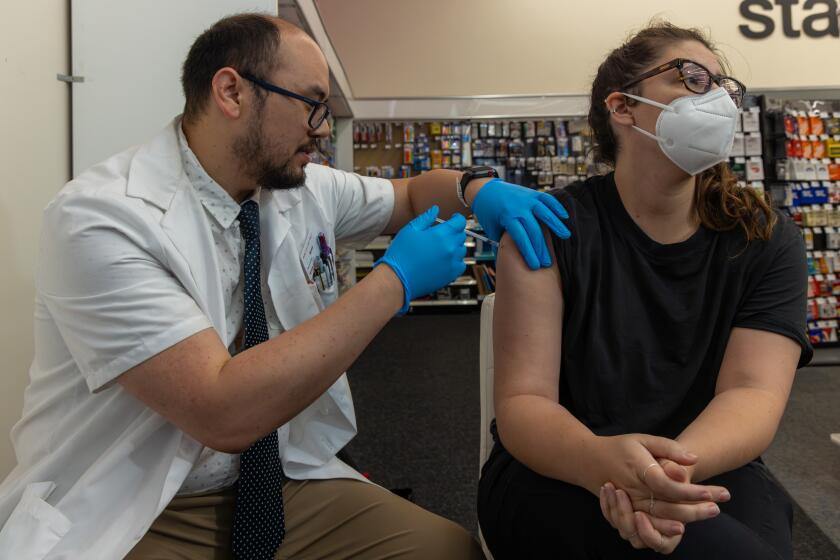Hezbollah, Israel trade heavy cross-border fire as Blinken seeks to prevent regional escalation

BEIRUT — Israel and Lebanon-based Hezbollah traded fire Saturday in one of the heaviest days of cross-border fighting in recent weeks, a day after the militia’s leader urged retaliation for the targeted killing, presumably by Israel, of a top Hamas leader in Lebanon’s capital.
Hezbollah leader Hassan Nasrallah said that if his group didn’t strike back for the killing Tuesday of Saleh Arouri, Hamas’ deputy political leader, all of Lebanon would be vulnerable to Israeli attacks.
With the risk of regional escalation, U.S. Secretary of State Antony J. Blinken kicked off an urgent Middle East diplomatic tour, his fourth since the Israel-Hamas war erupted three months ago.
Blinken met with the leaders of Turkey and Greece on Saturday as fears grow that the war between Israel and Hamas in Gaza may expand into a broader conflict.
Developments in Lebanon, northern Israel, the Red Sea and Iraq have put intense strains on what had been a modestly successful U.S. push to prevent a regional conflagration. The crisis was triggered when Hamas attacked Israel on Oct. 7, killing about 1,200 people, mostly civilians, and kidnapping about 240 others. International criticism of Israel’s military response, in which more than 22,000 Palestinians have been reported killed, continues to mount.
Blinken held talks with Turkey’s president, Recep Tayyip Erdogan, and foreign minister, Hakan Fidan, in Istanbul about what Turkey and others can do to exert influence, particularly on Iran and its proxies, to ease tensions, speed humanitarian aid deliveries to Gaza and begin planning for reconstruction and governance of postwar Gaza. Much of the territory has been reduced to rubble by Israeli bombardments.
America’s top diplomat later stopped in Chania, a port city on the Mediterranean island of Crete, to see Greece’s prime minister, Kyriakos Mitsotakis, at his residence. “These are difficult and challenging times,” Mitsotakis said.
New data show pronounced recent jumps in the rate at which coronavirus and flu tests are coming back positive, as well as the number of hospital-admitted patients testing positive for the viruses.
Hours before Blinken’s meetings, Hezbollah said it launched 62 rockets toward an Israeli air surveillance base on Mt. Meron and scored direct hits in its “initial response” to Arouri’s killing. It said rockets also struck two army posts near the border. The Israeli military said about 40 rockets were fired toward Meron and that a base was targeted. The army’s chief spokesperson, Rear Adm. Daniel Hagari, said the rockets caused no casualties in Israel.
Hagari said the military struck the Hezbollah squads that fired the rockets and also attacked Hezbollah military sites. Hezbollah said six of its fighters were killed Saturday, raising the toll since the fighting began to 150.
Israeli airstrikes on southern Lebanon hit the outskirts of Kouthariyeh alSiyad, a village about 25 miles from the border, Lebanon’s state-run National News Agency said, adding that there were casualties. Such strikes deeper inside Lebanon have been rare since the border fighting started nearly three months ago. NNA also said Israeli forces shelled border areas including the town of Khiam.
Separately, the armed wing of the Islamic Group in Lebanon, the country’s branch of the Muslim Brotherhood and a close ally of Hamas, said it fired two volleys of rockets toward the Israeli city of Kiryat Shemona on Friday night. Two of the group’s members were killed in the strike that killed Arouri.
Stepped-up attacks on commercial shipping in the Red Sea by Yemen’s Iran-backed Houthi rebels have disrupted international trade and led to increased efforts by the U.S. and its allies to patrol the vital commercial waterway and respond to threats. The coalition of countries issued what amounted to a final warning to the Houthis on Wednesday to cease their attacks on vessels or face potential targeted military action. Since Dec. 19, the militants have carried out at least two dozen attacks in response to the Israel-Hamas war.
From the Turkish officials, Blinken sought at least consideration of potential monetary or in-kind contributions to reconstruction efforts in Gaza and participation in security arrangements, according to U.S. officials. Erdogan has been harshly critical of Israel and Prime Minister Benjamin Netanyahu for the prosecution of the war and the impact it has had on Palestinian civilians.
Blinken “emphasized the need to prevent the conflict from spreading ... and work toward broader, lasting peace that ensures Israel’s security and advances the establishment of a Palestinian state,” the U.S. State Department said in a statement summarizing Blinken’s meeting with Erdogan.
Blinken also stressed the importance that the U.S. places on Turkey’s ratification of Sweden’s membership in the North Atlantic Treaty Organization, a long-delayed process that the Turks have said they will complete soon. Sweden’s entry to the alliance is seen as a significant response to Russia’s invasion of Ukraine.
A Turkish official said Fidan told Blinken that Israel’s “increasing aggression” in Gaza was a threat to the region and he called for an immediate cease-fire and the delivery of “uninterrupted” humanitarian aid. Fidan said negotiations for a two-state solution should begin “as soon as possible,” according to the official, who spoke on condition of anonymity because of the sensitivity of the issues in the private talks.
Fidan also said Turkey was awaiting the outcome of its request to upgrade its fleet of F-16 fighter jets and stressed that the ratification of Sweden’s NATO membership lay in the hands of the Turkish parliament.
Blinken’s day was ending in Jordan, which apart from Israel has been his most frequent stop on his recent Middle East tours.
He plans to be in Qatar, the United Arab Emirates and Saudi Arabia on Sunday and Monday. Blinken will visit Israel and the West Bank on Tuesday and Wednesday before wrapping up the trip in Egypt.
In recent weeks, Israel has been scaling back its military assault in northern Gaza and pressing its offensive in the territory’s south, where most of Gaza’s 2.3 million Palestinians are being squeezed into smaller areas in a humanitarian disaster while being pounded by Israeli airstrikes.
Netanyahu in a video statement reiterated that “the war must not be stopped” until the objectives of eliminating Hamas, getting Israel’s hostages returned and ensuring that Gaza won’t be a threat to Israel are met.
On Saturday, the Health Ministry in Hamas-run Gaza said 122 Palestinians had been killed over the last 24 hours.
Al Aqsa Martyrs Hospital in the central city of Deir al Balah received at least 46 bodies overnight, according to hospital records seen by the Associated Press. Many were men who apparently had been shot. The dead also included five members of a family who were killed in an airstrike.
The latest Israeli-dropped leaflets urged Palestinians in some areas near the hospital to evacuate, citing “dangerous fighting.”
In the southern Gaza city of Khan Yunis, the focus of Israel’s ground offensive, the European Hospital received the bodies of 18 people killed in an overnight airstrike on a house, said Saleh Hamms, head of the hospital’s nursing department. Citing witnesses, he said more than three dozen people had been sheltering in the house, including some who had been displaced.
Israel has held Hamas responsible for civilian casualties, saying the group embeds itself within Gaza’s civilian infrastructure. Still, international criticism of Israel’s conduct has grown because of the rising civilian death toll. The United States has urged Israel to do more to prevent harm to civilians, even as it sends weapons and munitions while shielding its close ally against international censure.
Associated Press writer Andrew Wilks in Istanbul contributed to this report.
More to Read
Sign up for Essential California
The most important California stories and recommendations in your inbox every morning.
You may occasionally receive promotional content from the Los Angeles Times.











